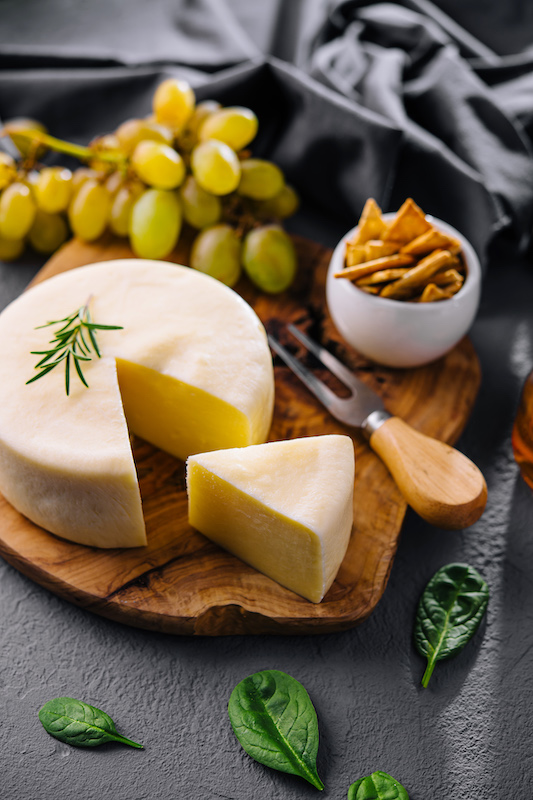Food is something that brings us together across nations, cultures, and languages. You may not know the first thing about a country, but if you show appreciation and gratitude for the coginio (cooking / cuisine), you’re instantly much more likely to make yourself a popular guest.
You could even say that food is something of a universal language – across different traditions and ways of life, we all need to eat, and we all express ourselves and our identities through what we eat.
When it comes to this, the Welsh are no different to anyone else. From the famous cawl (soup, particularly of leeks) to comforting bara brith, food is important, and valuable, and a reminder of home. That shows up in language just as it does in everyday life. So, read on to get to grips with 10 fun Welsh sayings that incorporate food!

1. Y drwg yn y caws
Food: caws (cheese)
Literal translation: the bad spot in the cheese
English meaning: the only problem
Ever had an idea or plan that seemed perfect, except for one little problem that ends up ruining the whole thing? Well, that one little problem was y drwg yn y caws. This phrase is a rough equivalent to the English fly in the ointment.
Here, the word drwg, which is normally an adjective meaning bad, is being used as a noun. You could translate it as badness or bad thing, and in this context it probably refers literally to a bit of caws that has gone mouldy…
Mae hi ‘di adael yn barod?! Wel, dyna’r drwg yn y caws!
She’s already left?! Well, that’s a fly in the ointment!
2. Gormod o bwdin a dagith gi
Food: pwdin (pudding)
Literal translation: too much pudding chokes a dog
English meaning: too much of what you want can hurt you
Oh dear. This proverb, relying on the verb tagu (to choke), isn’t the most pleasant for dog-lovers. But it’s a useful one, as it’s an example usage of the word pwdin, a borrowing from the English word, and also shows how pwdin responds to the soft mutation, becoming bwdin.
You could also argue that its meaning is quite wise. Gormod o bwdin in this case is kind of like too much of a good thing, but it’s also used in a similar way to curiosity killed the cat. It’s basically a reminder that what you want isn’t always what’s good for you.
3. Tyn fel penwaig yn yr halen
Food: penwaig (herrings) and halen (salt)
Literal translation: tight like herrings in salt
English meaning: like tinned sardines
This idiom is pretty close to its English equivalent, except instead of sardîns, the Welsh have penwaig (herrings). It’s quite an unusual plural form – the singular is pennog (a herring) or sometimes penogyn.
This is also a useful phrase because it includes not just one but two pieces of food vocabulary. Halen, meaning salt, was long used as a preservative to keep bwyd (food) good for longer, which is probably why it turns up in this expression.
Some people will omit the word tyn (tight) and just say fel penwaig yn yr halen.
Roedd y plant yn eistedd yng nghefn y car, yn dyn fel penwaig yn yr halen.
The children were sitting in the back of the car, packed like sardines.
4. Taten ddrwg
Food: taten (potato)
Literal translation: a bad potato
English meaning: a black sheep
You may not immediately recognise the Welsh word taten, as most people are more familiar with the plural form, tatws (potatoes). In general, food words in Welsh tend to default to the plural as their base form.
This term shows up in the longer proverb mae na daten ddrwg ym mhob sach (there’s a bad potato in every sack), but you can also just use it by itself in a similar way to the English equivalent a black sheep, as in the black sheep of the family. Rest assured, though, that you can also translate the latter literally – mae na ddafad ddu ym mhob praidd (there’s a black sheep in every flock).
5. Berwi fel cawl pys
Food: cawl pys (pea soup)
Literal translation: boiling like pea soup
English meaning: chattering on and on
This is one idiom that you’re sure to hear again and again when talking in Welsh! Geiriadur Prifysgol Cymru first reported it being used in Ceredigion, but it’s in common parlance all over the country, and will be understood by anyone you speak to. It’s also one of quite a few sayings that rely on the word berwi (boiling).
Quite simply, this phrase is just used to refer to someone being a real chatterbox. Which brings us smoothly onto our next expression…
6. Siarad fel melin bupur
Food: pupur (pepper)
Literal translation: talking like a pepper mill
English meaning: chattering on and on
Clearly, the Welsh like to chatter about chattering! This saying can be used in exactly the same way as berwi fel cawl pys.
Pupur is generally used to refer to the condiment pepper. You can use it for the llysieuyn (vegetable), and some people do, but pupryn (a pepper) is probably more common overall.
Here, the word pupur has soft mutated to bupur, because it’s being used to describe melin, which is a feminine adjective. If you’re writing it down, be careful to spell melin (a mill) correctly – it’s a homonym of melyn (yellow) so it can be a bit confusing.
O mam bach, mae hi’n siarad fel melin bupur…
Oh my God, she’s chattering on and on and on…
7. Ennill ar y menyn, colli ar y caws
Food: menyn (butter) and caws (cheese)
Literal translation: winning on the butter, losing on the cheese
English meaning: swings and roundabouts
Time to talk caws again! And here we’re also using menyn (butter), another really handy piece of vocabulary.
This phrase is used to convey when a situation will have plusses and drawbacks no matter what you do, so it’s pretty similar to the English swings and roundabouts. I wonder if it might have originally referred to farm shows and village fairs, where someone might win a gwobr (prize) for presenting a particularly impressive dairy products!
8. Fel rhech mewn pot jam
Food: jam (jam)
Literal translation: like a fart in a jam jar
English meaning: useless
The letter j has got to be the most controversial of the Welsh alphabet! J was added into the alphabet officially some fifty years ago but has been used by Welsh speakers for loan words for much longer. Many people, though, insist that it’s not authentically Welsh and that it should be removed. So even though jam appears exactly the same as its English equivalent, it has a hidden importance…
Whatever you think of jam in any language, this silly phrase is the equivalent of the English phrase a chocolate teapot. It’s just demonstrating something so utterly useless as to be ridiculous. I certainly wouldn’t want to be described with this idiom!
Does dim dysgu arno. Fel rhech mewn pot jam ydy o.
He can’t be taught. He’s as useless as a chocolate teapot.
9. A ddwg wy a ddwg fwy
Food: wy (egg)
Literal translation: the one that steals an egg will steal more
English meaning: a leopard can’t change its spots
Wy is the Welsh word for egg. It’s sometimes also spelt with a circumflex accent on the w, and is pronounced either oo-ee or oi depending on if the speaker is from North or South Wales.
This saying opines that someone who has stolen even something as small as an wy is likely to continue stealing. You may agree or disagree with the sentiment, but you’ve got to admit the rhyme makes this proverb very satisfying to say.
Addawodd roi’r gorau i ysmygu ond des i o hyd i becyn o sigaréts yn ei ystafell. A ddwg ŵy a ddwg fwy!
He promised to stop smoking but I found a pack of cigarettes in his room. A leopard never changes its spots!
10. Cael caws o fola ci
Food: caws (cheese)
Literal translation: getting cheese from a dog’s belly
English meaning: doing something impossible
Not caws again! Though you have to admit that the logic behind this idiom is sound – it would be pretty difficult to get cheese from a dog’s belly.
It kind of works on two levels, as it would be literally physically impossible to get caws from a dog as you would a buwch (cow), but you could also read it as implying that it’s hard to take caws away from a ci that wants to eat it. Either way, it’s a really fun expression which you can easily slip into your next Welsh conversation.

Did you learn any new vocabulary from this article? A new idiom to slip into your next conversation? Or perhaps you just learnt that Welsh people are really obsessed with cheese
Either way, we’d love you to share any funny or interesting food-related idioms or proverbs that we missed. The Welsh language is truly a gift that keeps on giving.

